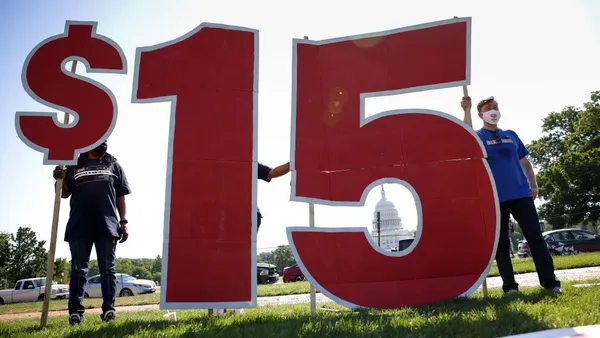Dive Brief:
- CNN has agreed to pay $76 million to resolve a dispute over back pay with more than 300 individuals who provided video services to the news network, the National Labor Relations Board (NLRB) announced Jan. 10.
- The sum is the largest monetary remedy in NLRB history, the board said. Per the statement, the dispute dates to 2003, when CNN terminated a contract with Team Video Services (TVS) and hired new employees to perform the same work without recognizing or bargaining with labor unions representing TVS employees. In 2014, NLRB found CNN had violated the National Labor Relations Act (NLRA) and ordered the company to bargain with the unions and provide back pay. The parties later agreed to resolve the dispute through NLRB's Alternative Dispute Resolution program.
- "After more than a decade of litigation, negotiation and appeals we are pleased to have resolved a longstanding legal matter," a CNN spokesperson told HR Dive via email.
Dive Insight:
The NLRA requires employers in many situations to recognize an outgoing union, Michael J. Wietrzychowski, partner and co-chair of the labor and employment practices group at Schnader Harrison Segal & Lewis, told HR Dive in an emailed statement. That may include bargaining over the terms of conditions of employment for replacement employees, he noted.
Specifically, employers may encounter a duty to bargain when they decide to end the employment of unionized employees and rehire some or all of those employees into the same positions, according to Wietrzychowski.
"The standards governing an employer's duty to bargain and an employer's conduct during bargaining are complex and multi-faceted, and continue to develop under the current National Labor Relations Board," Wietrzychowski said. "Therefore, employers facing these circumstances should consider proceeding with caution, planning carefully, and closely consulting with legal counsel to determine bargaining obligations they may have regarding employees."
Despite some recent policy changes that are widely considered employer-friendly, federal agencies have seemingly continued rigorous enforcement under the Trump administration. The U.S. Department of Labor's Wage and Hour Division, for example, collected a record $304 million in back pay during its 2018 fiscal year. Change may be on the horizon, however, as appointees settle in.










